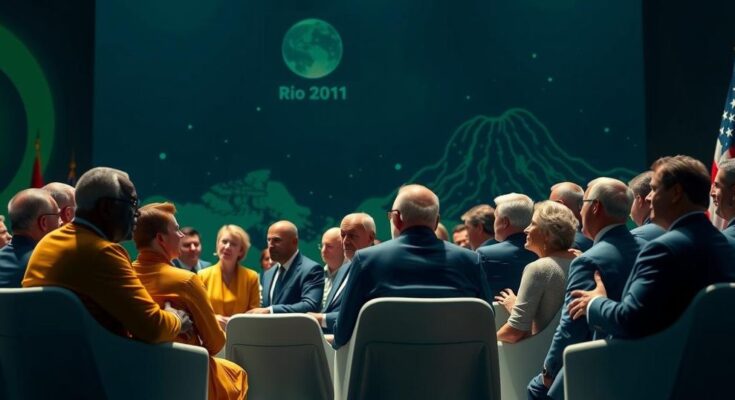G20 leaders met in Rio de Janeiro to prioritize sustainable development and climate finance ahead of COP29 in Azerbaijan. They called for significant increases in funding to help developing nations combat climate change while addressing concerns over the potential reversal of U.S. climate commitments with a possible Trump reinstatement. The summit also included discussions on legally binding agreements to reduce plastic pollution.
On Tuesday, leaders of the Group of 20 (G20) major economies convened in Rio de Janeiro to focus on sustainable development and energy transition amid rising global temperatures. Their discussions aimed to enhance the likelihood of a successful outcome at the upcoming U.N. climate summit in Azerbaijan, following an urgent call from COP29’s host for tangible action against climate change. With the potential return of Donald Trump to the U.S. presidency signaling a rollback on climate commitments, leaders emphasized the necessity of substantial financial commitments to combat climate issues. In a joint statement released prior to the summit, the G20 countries supported the need for increasing climate finance from billions to trillions, acknowledging that wealthy nations must contribute significantly to assist developing countries in tackling climate change. While proposals for annual funding of at least $1 trillion have been discussed, developed countries have advocated for contributions from wealthier developing nations and affluent Middle Eastern states. However, Brazil and other developing nations resisted this expansion, emphasizing accountability among the primary greenhouse gas emitters. President Luiz Inacio Lula da Silva underscored the urgent need to address climate change, citing its global impact. Notably, G20 nations, representing 85% of the global economy and a majority of climate emissions, play a critical role in establishing the agenda for climate action. The group also committed to finalizing a legally binding treaty to combat plastic pollution by the end of 2024, aimed at concluding over two years of negotiations on the issue.
The G20 summit in Rio de Janeiro focused on the urgent need to address climate change, particularly in the lead-up to significant U.N. climate negotiations scheduled to take place in Azerbaijan. Given the alarming forecasts for global warming and the potential shift in U.S. climate policy with a Republican presidency, G20 leaders are aiming to solidify their commitments to climate finance and establish concrete goals for future collaboration. The discussions also reflect ongoing tensions between developed and developing nations regarding the financial responsibilities for climate action.
In conclusion, the G20 leaders’ summit in Rio emphasized the pressing need for a unified global approach to combat climate change and enhance financial commitments to support developing nations. With the specter of changing political dynamics in the U.S., the urgency for substantial climate finance was a prominent subject. Sustainable practices and pollution reduction are also on the agenda, reinforcing the G20’s influential role in global climate policy-making.
Original Source: www.straitstimes.com




